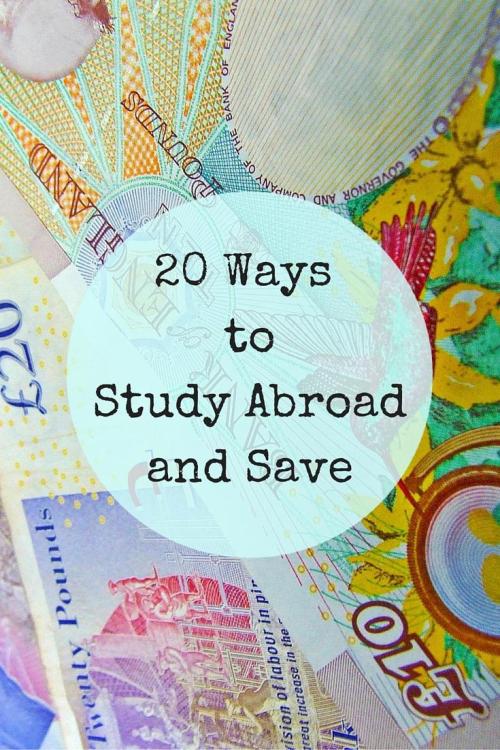20 Ways to Study Abroad and Save
Studying abroad can be quite expensive. From airfare to accommodation, sightseeing and weekend trips to explore your host country, it all adds up quickly. To avoid a bad surprise and a mountain of debt when you come home from your study abroad adventure, here are some ways to study abroad and save.
This guest post of ways to study abroad and save was contributed by Rose Jensen, who writes about the online college courses.
1. Decide where you want to study abroad
Certain cities like London or Paris have a high appeal for foreign students, but they are also pricey because they are study abroad hotspots. Lesser traveled cities can just as exciting and beautiful, yet a lot less expensive. Set yourself apart from the other students and study in Berlin, Prague or Strasbourg instead. That way, you’ll have money left over to go travel and explore on the weekends and see more during your study abroad adventure. So study abroad in Berlin and do a weekend getaway to Paris instead.
2. Apply for Study Abroad Scholarships
There are plenty of study abroad scholarships available for students who want to study abroad. Search for these through your school and the internet. Some of these scholarships have early application deadlines, so make sure that you apply on time.
3. Work over the summer
Remember that you’ll be spending an entire semester on a semi-vacation when you go abroad, and sacrificing your lazy summer days for a busy money-earning job won’t seem too bad, if you keep your goal in mind. Maybe you can even do something that will help you further during your time in a foreign country, like become an English tutor online for students from your future host country or use your foreign language skills to earn money as a translator.
4. Do odd jobs for extra funds
Sell your old clothes, books and belongings or try to find a temporary side job, like copywriting or virtual assistant to earn some more cash.
5. Look at flight rates constantly
Shop around for cheaper tickets, and though you’ll probably have to endure a few connecting flights, it’ll be worth it in the end. There are many websites that let you check and compare your flights. Also keep in mind that direct flights are usually more expensive. Depending on your location, also check fares from nearby airports and play around with your departure dates. The more flexibility you have, the more you will be able to save on your tickets.
6. Get an International Student Identity Card
The ISIC card can get you discounts on bus fares, phone plans, and a multitude of other things while you’re abroad.
7. Go abroad with a friend
Having someone to travel with means you don’t need to pack or buy as many things on your own. If you plan to get an apartment there, having several roommates to share the rent helps also.
8. Split meals with a friend
You can easily share big lunches and dinners with a friend or order an appetizer instead of a full meal to avoid draining your wallet and expanding your waistline. Instead of meeting your friends for dinner or lunch, invite them over and cook something or meet them for drinks afterwards.
9. Reduce partying
Yes, studying abroad is a once in a lifetime experience and you want to party it up in all the cool clubs of the city you are living in. But going out several times a week can get very costly over a couple of months. Partying with your friends is definitely something you should do when you are abroad, just don’t overdo it. Spend some nights in or scale back on the drinks when you go out to reduce your cost.
10. Don’t exchange money at the airport
Some of the ways to study abroad and save money, you won’t even feel. Just be smart about your organization and planning. For example, exchange rates at the airport are notoriously bad, and there is usually a surcharge. Hunt around different banks for the best exchange rate or withdraw directly from an ATM (check with your bank about international transaction fees or look into opening a bank account that does not charge fees, even if it is just for your study abroad time) so you can get the most out of your currency.
11. Do exchange money at your destination
 It is often cheaper to change your money to the foreign currency when you are abroad, than to do the transaction at home. As I mentioned before, try to find a bank that does not charge a foreign transaction fee and just pull money from ATMs as needed. That way, you don’t risk carrying large sums of cash with you and losing your money or even worse, having it stolen.
It is often cheaper to change your money to the foreign currency when you are abroad, than to do the transaction at home. As I mentioned before, try to find a bank that does not charge a foreign transaction fee and just pull money from ATMs as needed. That way, you don’t risk carrying large sums of cash with you and losing your money or even worse, having it stolen.
12. Enjoy free tours of your city
There are plenty of free ways study abroad and save money while having adventures and exploring your new city. Scoop out the museums on their free day or take a bus to a random area and enjoy a long walk through the different neighborhoods. Many cities offer tip-only walking tours or check the bulletin board at your university. Many student organizations offer free fun activities like pub crawls or game nights.
13. Avoid the tourist traps
There are always certain bars and restaurants in popular destinations that cater to out-of-towners, and because of this, are overpriced. Avoid them.
14. Eat what the locals eat
The local people are the best resource for cheap and delicious eats. See where they’re chowing down and do the same. Ask your local friends and go to lunch with them or ask them where they like to go eat and drink. You will experience your host country in a much more authentic way, connect with your local friends and save money at the same time.
15. Do what the locals do
Talk to your local friends about what fun things they do and where to buy stuff cheaply. They have inside information on the best and most affordable places to be and things to do, so don’t be shy and ask for their help.
16. Cook instead of dining out
One of my favorite ways to study abroad and save is to cook at home and reserve eating at restaurants for special occasions. You can save a hefty load of cash by buying groceries and cooking your own meals instead of dining out every day. If you don’t know how to cook, learn to make a few dishes before you go. When you make local friends, invite them over and cook a traditional meal from your home country for them.
17. When traveling out of the city, consider staying at a hostel
You will want to explore the surrounding places outside of your abroad city, and hostels are a cheap, student-friendly alternative to pricey hotel rooms. Other alternatives could be Couchsurfing or AirBnB as alternatives to regular Hotels. Also keep in mind that in some countries the hotel price depends on the number of guests, so even if you share a room, it could be pricy.
18. Make local friends and visit often
Local friends can not only bring you to the best places to eat and have fun, but they can also host free dinners and functions at their homes. When you hang out with people who grew up in your host country, you will practice your language skills, get a better understanding of your host country and its culture and make memories that will last a lifetime.
19. Avoid cabs
Unless you’re in a tight situation where a taxi is needed, travel by foot or use public transportation instead. In many European countries, the university fee includes a free pass for public transportation within the city. Find out if something like this exists and take advantage of it. Also keep in mind that you most likely get a reduced rate, if you show your student ID.
20. Get a part time job
And the last of the 20 ways to study abroad and save tips is, yes, you guessed right: Get a job! Some countries will allow students without a work visa to earn some cash on the side. You can tutor English, work as a translator, get a babysitting gig or help your elderly neighbor with the grocery shopping. Every little bit counts and you might be able to save up enough for another must-see weekend getaway or a couple of nights out on the town.
Do you have any more tips and ways to study abroad and save money?







Hi Rose,
Great pointers. I love lists that are in the form of action items. I would also say that before leaving you should consider making a budget. Even if you save $25 a week, every week for 6 months, that’s $600! It helps to know that all the small things that you do can add up in huge ways. Then the price tag of traveling abroad doesn’t seem so overwhelming.
Cheers!
Olga
.-= Olga´s last blog ..International Scholarships & Fellowships Opportunities =-.
I can’t see your blog .